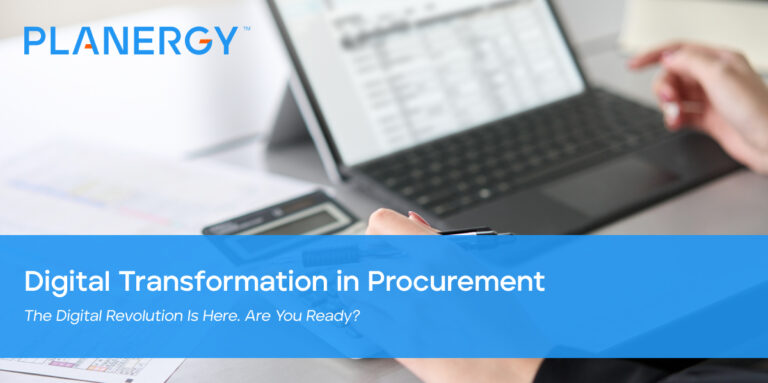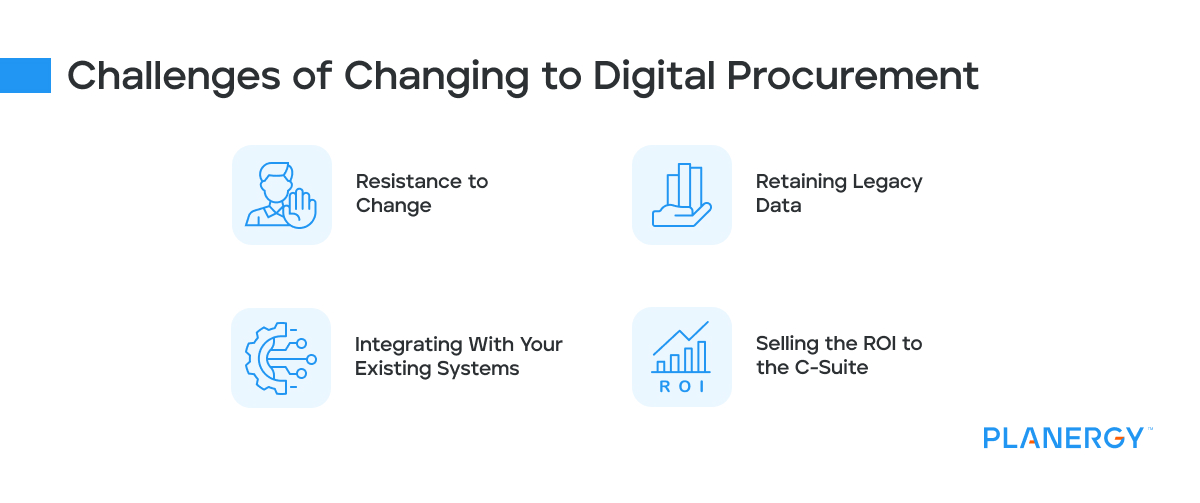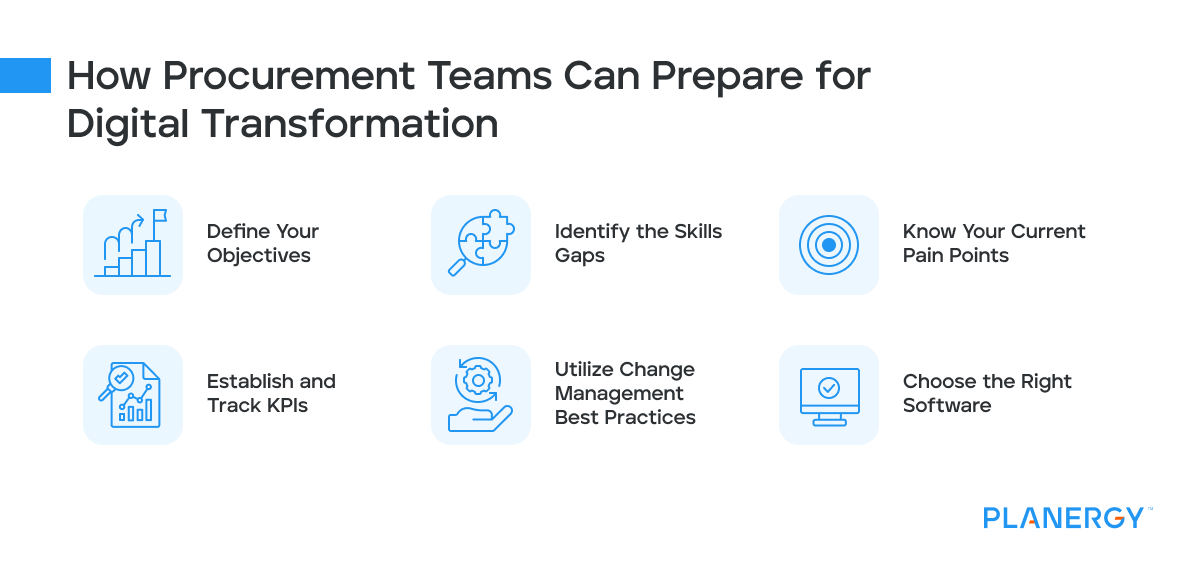The age of digital transformation in procurement has arrived. The use of paper forms and Excel sheets is phasing out and the use of dedicated procurement software is becoming the standard.
In a 2022 PwC report, 86% of organizations reported using procure-to-pay (P2P) software, with 70% of companies using a market solution and only 14% building their own solution in-house.
On top of that, 82% of highly digitalized companies report creating value through the procurement data that they access through these systems.
The world’s business is now conducted on the global online marketplace. The future of effective procurement lies not just in what a procurement department researches, buys, and manages—but how.
Digital transformation in procurement is drawing a line between companies that seek a true competitive advantage and those that find themselves left in the digital dust.
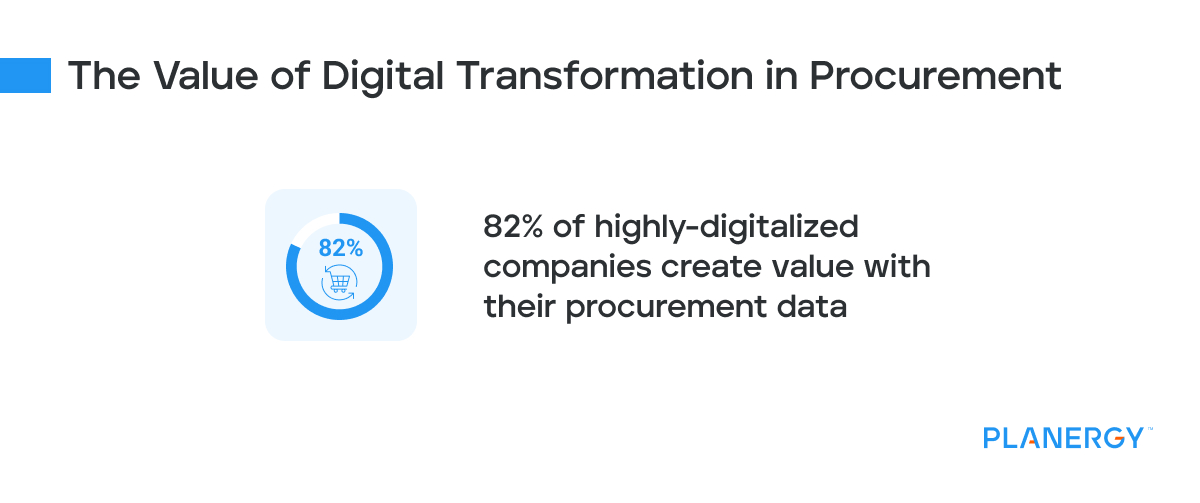
What Is Digital Transformation?
Digital transformation is a comprehensive embrace of digital technologies by a business or organization. The goal is to increase productivity, identify and create sources of enduring value, and streamline business processes to improve efficiency.
Digital transformation touches every industry. It’s created an on-demand world; one-click orders, same-day delivery, social media-based customer support, and instant access to just about everything. Convenience and access have become the name of the game.
Companies like Uber, Amazon, and DoorDash have transformed consumer expectations and redefined real-time user experiences, personalization, and customer service.
In the procurement world, embracing digital transformation can help you leverage new technologies to build a stronger value chain for your organization.
What Is Digital Transformation in Procurement – i.e. Digital Procurement?
Digital transformation in procurement centers around switching from outdated, manual processes to automated and streamlined ones.
This is done through digital procurement platforms designed to enhance every step of the procurement process, from requisitions to accounts payable. This transforms the full procure-to-pay process to a streamlined digital process.
Before digital procurement, most of the value in procurement was created purely from cutting costs and finding savings where you could. While realizing cost savings and negotiating with suppliers is still important there is much more than can be achieved when going digital.
Today, eProcurement solutions move beyond simple cost reduction and create new opportunities for more effective procurement processes, from supply chain management to big data analytics.
Digital procurement helps companies improve their bottom line, become more competitive on a global scale, and uncover value through the rich data and analytics now available to them.
Digital procurement shifts the role of Chief Procurement Officers (CPOs) and other procurement professionals away from simple cost-cutting and toward creating lasting value through advanced analytics and other capabilities.
What Are the Benefits of Digital Procurement?
Digital procurement provides a host of benefits that are centered around efficiency, transparency, and cost-effectiveness. Leveraging procurement software streamlines the procurement process, helps you actualize your procurement strategy, and provides the following benefits:
Cost savings and Spend Control
Digital procurement gives procurement leaders the ability to better control spending through a centralized digital platform.
Rules, approvals, budgets, and spending limits can be programmed and nearly impossible to break. This creates opportunities for cost savings, along with making it easier to stay on budget.
Higher Efficiency and Productivity
Under traditional systems, much of the routine procurement tasks and done manually, for example creating purchase orders from paper forms or matching invoices by looking at two pieces of paper side by side.
Procurement automation frees up your team for higher-level decision-making and value creation.
Incorporating AP Automation software into the process with accounts payable digital transformation to cover digitizing full the procure-to-pay process further increases efficiency and accuracy.
Better Supplier Management
The big data analytics from procurement software (and the reporting interfaces) help you better manage and track suppliers.
With spend analytics software you can set up KPIs to track supplier performance, perform contract management, and monitor supply chain risks. You can also use this data to identify opportunities to improve supplier relationships.
Complete Spend Visibility
Procurement software data also gives you better visibility into your own spending patterns.
These reports can help you see where you’re overspending, make more informed buying decisions, monitor procurement KPIs, and optimize your procurement strategies based on internal trends.
Easier Compliance and Less Risk
Enforcing compliance is much easier when done digitally.
Approval routing, limits, and rules ensure that your team meets compliance guidelines. This also improves risk management by reducing rogue spending from unapproved vendors, as everything will go through the system that you’ve set up.
Insights From Centralized Data
Modern procurement platforms are able to integrate with your ERP and accounting software, creating a data-rich ecosystem where the data you need is always at your fingertips.
Rather than requesting or digging for what you need, it’s there when you need to act on it.
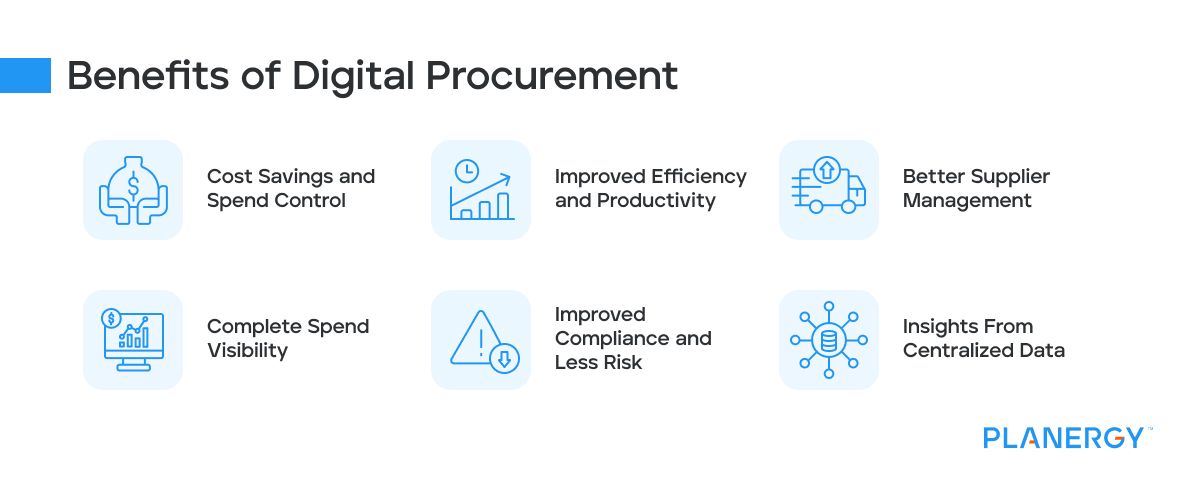
What Are the Challenges of Changing to Digital Procurement?
Transitioning to digital procurement offers similar disruptions to just about every organization.
Change is always going to be hard, but the long-term benefits far outweigh the short-term pain when it comes to digital procurement. Some of the challenges you can expect include:
Resistance to Change
People used to the ‘old system’ and workflows might become slow adopters.
Employee pushback when implementing digital transformation can be common and difficult to deal with. Increased fears of losing jobs or being replaced by artificial intelligence in procurement roles can be a factor in this.
Applying broad change management best practices and having a change management plan in place with thorough onboarding, training, support, and continually communicating the benefits can mitigate this.
Retaining Legacy Data
To maintain a historical record, you’ll ideally want to import the old Excel sheets into your new system.
This may not be possible. But if it is then it will require some data cleaning and formatting which may be labor intensive.
Integrating With Your Existing Systems
Some digital procurement systems require manual integrations to be set up by developers.
This might require manual export and import routines to be followed. Look for solutions that have out-of-the-box integrations with your preferred systems to avoid this.
Selling the ROI to the C-Suite
Digital transformation is time consuming and can be costly. Every area of business is likely reviewing a digital transformation strategy.
To get procurement transformation prioritized you may be required to do some internal selling to the higher-ups to get the go-ahead for digital procurement.
However, the ROI is significant, with some PLANERGY customers seeing 20x returns when moving to e-procurement software and time to value of just a few months.

Set yourself up for a successful procurement digital transformation by preparing for these challenges before taking them on.
Involving all necessary stakeholders from the get-go, having a digital transformation implementation plan, and communicating often will go a long way. Doing so will drive value creation for years to come.
How Can Procurement Teams Prepare for Digital Transformation?
A successful digital transformation of procurement starts with a comprehensive strategy (focused on growth rather than just reducing costs), a supportive culture, and access to a digital procurement platform.
Without these in place, your digital transformation efforts could be doomed to fail.
While digital transformation can radically transform and improve the procurement process, it’s essential to prepare for making big changes. Here are some strategies you can use to prepare your organization for digital procurement:
Define Your Objectives
Clearly define how digitizing the procurement process aligns with your digital transformation strategy.
This can go beyond just cutting costs, but also on how to create more value, develop partnerships with essential suppliers, or reduce supply chain risks.
Identify the Skills Gaps
Having done things ‘the old way’ for so long, it’s likely that you have a gap in the skills you need to execute digital procurement.
Figure out where the gaps are for skills like data analysis, software configuration, or even just using procurement software. Then, find ways to fill those gaps through training or hiring.
Know Your Current Pain Points
Procurement teams should thoroughly assess their current processes and identify the bottlenecks before switching to digital procurement. You can then prioritize solving these issues as you implement a new system.
Establish and Track KPIs
If you’re not measuring the impact, are you really improving?
Establishing procurement key performance indicators (KPIs) to track during your digital transformation will keep you informed on the impact you’re creating.
Benchmark against historic performance to ensure you are seeing real value from the change. This also lets you know where you’re succeeding and where you can strive for further improvement.
Utilize Change Management Best Practices
Digital transformation change management plans are designed to soothe the common pain points mentioned above.
The plan should cover how you communicate the benefits of digital procurement, your onboarding and training plan, and how you will support your team with the new tools and processes.
Choose the Right Software
The most important part of your roadmap is the digital procurement solution you choose.
You need to ensure that your procure-to-pay software has the features and flexibility you specifically need from end-to-end. If you choose something lacking functionality, it can be a painful experience.
PLANERGY has the flexibility to be configured to meet the needs of organizations in all types of industries and will future proof you for your changing needs as the company grows.
It’s worth noting again that 70% of organizations report using a market P2P solution, as opposed to 14% building one from scratch.
It’s typically less resource intensive to purchase a solution, rather than build one that will be more difficult to re-configure as your needs change over time.

Being proactive with your digital transformation strategy and future procurement operating model will help you avoid the pitfalls mentioned in the section above.
Set yourself up with a sound digital procurement strategy and the right digital solutions to implement it, and you will realize the many benefits that digital procurement offers.
Digital Transformation Is More Like Digital Evolution
Your digital transformation success story never quite gets to the ending. That’s because technology never stops improving, processes never stop streamlining, and procurement organizations never stop finding ways to create more value.
Some of your procurement technology and processes (like relying on Excel and paper forms) might go extinct, but the drive to improve will always continue.
The procurement function should never stop looking to improve, and to find and implement new tools that can help it get to a more productive place.
A true digital transformation is just the beginning of a never-ending process of continuous improvement.

